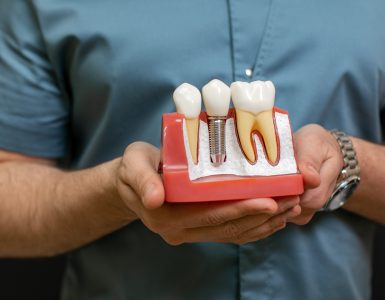Have you ever felt pain or discomfort in your teeth after eating ice cream or having a hot drink? If so, you’re not alone. Whilst this pain could be a sign of a cavity, it is also a common symptom in people who have sensitive teeth. Tooth sensitivity, or “dentin hypersensitivity” is pain or discomfort in the teeth as a response to things such as hot or cold temperatures, sweet or acidic foods or drinks, brushing or flossing your teeth and alcohol-based mouth washes. Even breathing in cold air, or rinsing your mouth out with cold water can be an issue.
What Causes Sensitive Teeth?
Some people are more likely to naturally have sensitive teeth than others due to having thinner enamel. The enamel is the tough outer layer of the tooth that protects the dentin and pulp inside the tooth. If this enamel gets worn down, it can expose the next layer inside the tooth, the dentin, which can cause the tooth to become hypersensitive.
So, what can cause the enamel to become worn down?
- The type of toothbrush you use. The tough bristles on a hard toothbrush over time can wear down the enamel on your teeth.
- Brushing your teeth too hard. Likewise brushing your teeth too hard can not only wear down the enamel, but cause your gums to recede thereby causing sections of the tooth to be exposed and unprotected.
- Grinding or clenching your teeth at night.
- Eating or drinking acidic food or beverages. If done regularly this can be one of the main triggers for sensitive teeth.
- Conditions that cause frequent vomiting. Conditions such as gastroesophageal reflux, gastroparesis and bulimia can cause acid to come up from the stomach and oesophagus and may wear down the enamel over time.
Other causes for sensitivity can be:
- Tooth decay, broken or chipped teeth and worn-down fillings or crowns. Any of these can leave the dentin exposed causing sensitivity.
- Whitening your teeth. Sensitivity is a possible side effect after teeth whitening. This is usually caused by the bleaching solution, which can remove minerals in the enamel causing the teeth temporarily to become porous thereby exposing micro tubules in the dentin.
- Dental work. It’s not uncommon for teeth to become temporarily more sensitive following fillings or crowns that leave the dentin in the tooth exposed, or following a dental clean.
Your dentist can examine the health of your teeth to check for any possible causes or potential problems that could cause tooth sensitivity and can guide you through the appropriate treatments.
How Can Tooth Sensitivity Be Treated?
There are some steps you can take to help manage the pain and discomfort of sensitive teeth.
- Over the counter treatments. For mild tooth sensitivity, there are toothpastes available made specifically for sensitive teeth with ingredients that help block the discomfort from travelling to the nerve of the tooth. Your dentist may be able give you a specific recommendation, but there are many you can choose from. Also, if you use a mouthwash choose one that is alcohol free and fluoridated and change to a softer toothbrush, remembering to brush your teeth more gently. This will be much easier on your gums and prevent further wear on your tooth enamel. You should experience some improvement within a week or so.
- Fluoride gel. Applying a fluoride gel to your teeth helps to strengthen the enamel by replenishing the minerals lost, helping to desensitise the dentin.
- Avoid highly acidic foods and beverages. Staying away from acidic foods and drinks will help prevent further wear on your tooth enamel.
- Stop clenching and grinding your teeth. If you find yourself regularly clenching or grinding your teeth, try to train yourself to stop by being mindful not to do so during the day. Reducing stress and caffeine intake at bedtime may help prevent you grinding your teeth at night. You may want to consider using a mouthguard at night to prevent any damage to your teeth.
- Brush more gently. If you have a problem with receding gums, it is important to brush more gently and maintain good oral hygiene. If the recession is severe and is causing significant discomfort, a surgical gum graft may be necessary. Tissue is taken from the roof of the mouth and placed over the root of the tooth to secure and protect it, thereby reducing sensitivity.
- Dental treatment. For teeth where a large part of the enamel is lost due to decay or significant damage, the tooth will need to be covered with a crown, inlays or bonding.
- Root canal. For severe sensitivity where other treatments are not working, a root canal is recommended as a last resort. The infected pulp of the tooth is cleaned and disinfected and the tooth is then filled and sealed.
As always prevention is best. Ensure you attend regular check-ups with your dentist and maintain your oral hygiene by brushing twice a day, together with daily flossing to keep your teeth in good condition.




